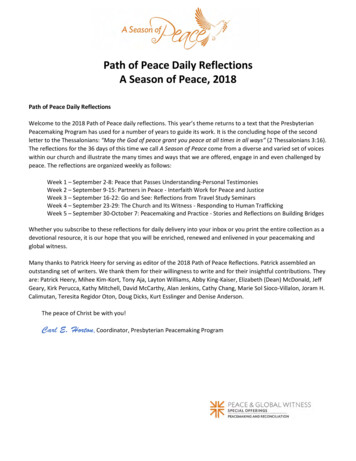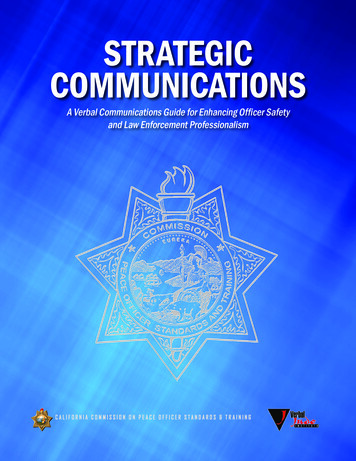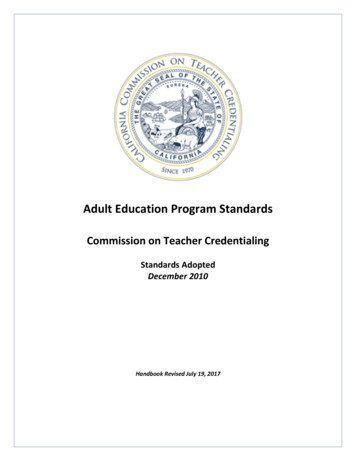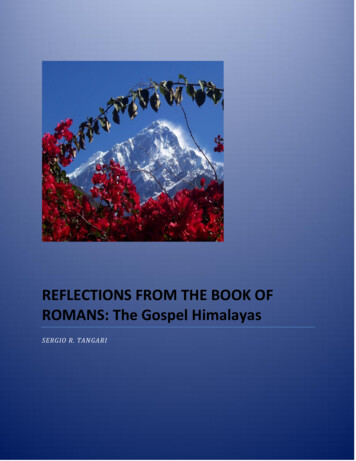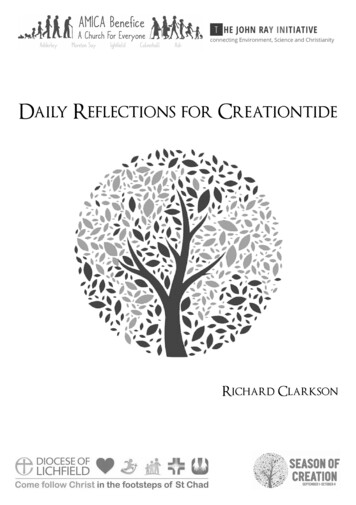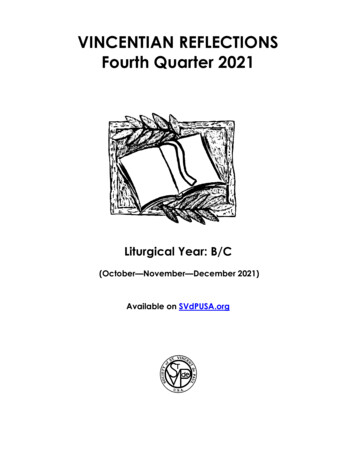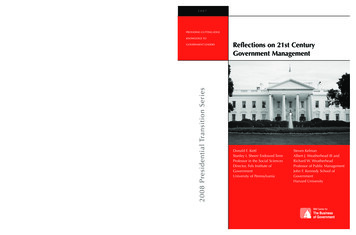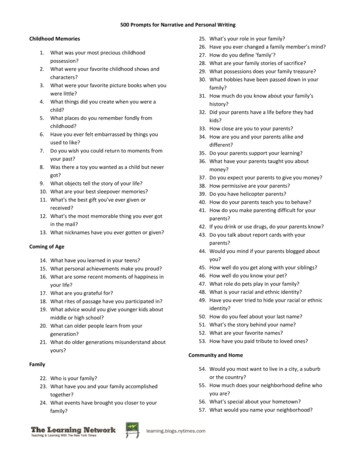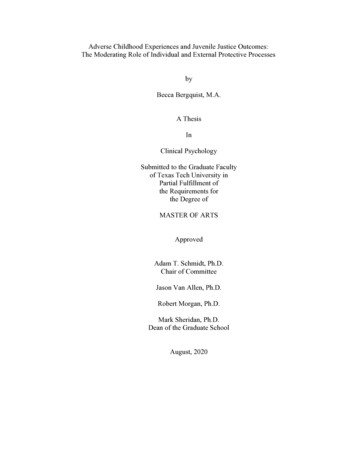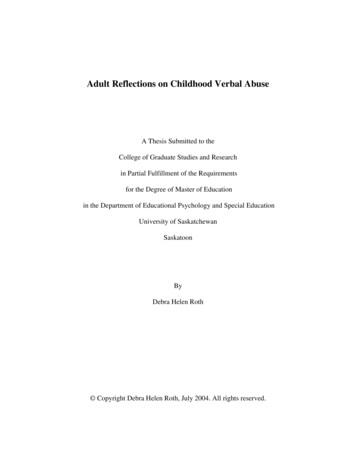
Transcription
Adult Reflections on Childhood Verbal AbuseA Thesis Submitted to theCollege of Graduate Studies and Researchin Partial Fulfillment of the Requirementsfor the Degree of Master of Educationin the Department of Educational Psychology and Special EducationUniversity of SaskatchewanSaskatoonByDebra Helen Roth Copyright Debra Helen Roth, July 2004. All rights reserved.
PERMISSION TO USEIn presenting this thesis in partial fulfillment of the requirements for aPostgraduate degree from the University of Saskatchewan, I agree that the Libraries ofthis University may make it freely available for inspection. I further agree that permissionfor copying of this thesis in any manner, in whole or in part, for scholarly purposes maybe granted by the professor or professors who supervised my thesis work or, in theirabsence, by the Head of the Department or the Dean of the College in which my thesiswork was done. It is understood that any copying or publication or use of this thesis orparts thereof for financial gain shall not be allowed without my written permission. It isalso understood that due recognition shall be given to me and to the University ofSaskatchewan in any scholarly use which may be made of any material in my thesis.Requests for permission to copy or to make other use of material in this thesis inwhole or in part should be addressed to:Head of the Department of Educational Psychology and Special Education28 Campus DriveUniversity of SaskatchewanSaskatoon, SaskatchewanS7N 0X1i
ABSTRACTThe purpose of this qualitative study was to describe, with the intention ofunderstanding, the lived experiences and meanings given to these experiences, of adultwomen who were verbally abused as children. Existing studies in the area of verbal abusehave often examined verbal abuse as part of psychological and/or emotional abuse or inconjunction with physical and sexual abuse. In order to more fully understand thephenomenon of childhood verbal abuse and to add to previous research, this studyfocused exclusively on verbal abuse using a hermeneutic-phenomenological researchapproach. Three adult women who experienced childhood verbal abuse, but who arecoping successfully despite negative childhood experiences, were interviewed in threeseparate in-depth conversations; these were augmented with observations, fieldnotes andother documents. After multiple readings of the transcripts, stories of the three womenwere told. Further analysis consisted of a guided existential reflection based on livedtime, lived body, lived space and lived relation (van Manen, 1990), to aid in the processof questioning, reflecting, writing, and coming to a deeper understanding of the waysthese women have experienced childhood verbal abuse.The findings from this study add to the understanding of childhood verbal abuseand perhaps will have the added benefit of bringing increased awareness of howdetrimental this form of abuse can be to an individual’s self-concept. Results suggest thatalthough verbal abuse experienced in childhood can have adverse consequences,individuals can manage to become stronger and more resilient. Future research focusingon the body/mind connection and age-related factors would be useful. Implications forcounselling practice are also described using recommendations from the participants.ii
ACKNOWLEDGEMENTSAs I come to the end of another chapter in my life I am aware that I owe a debt ofgratitude to many people who assisted me in completing this thesis. First of all I want tothank the women who agreed to be interviewed for this study: Ann, Susan, and Jesse.Your courage and willingness to be honest and open about your experiences of childhoodverbal abuse brought this issue to life and will hopefully raise the consciousness ofsociety about this widespread problem. Thank you.To my supervisor, Dr. Brian Noonan, thank you for your confidence in me and foroffering me your support and expertise. Thank you to Dr. Jennifer Nicol, my thesissupervisor in spirit, who enabled me to come to an understanding of hermeneuticphenomenology. Your encouraging comments and thorough editing of my chapters wasmuch appreciated. You were always willing to meet with me and listen patiently to myconcerns. Thank you also to Dr. Gina Harrison, another committee member who madetimely suggestions and helped me to consider all relevant perspectives. I am grateful tomy external examiner, Dr. Brian Chartier; your probing questions and insightfulcomments helped me to re-word and clarify certain points in my thesis.Thank you to my family members who always supported me and providedlistening ears when I needed to talk. Your prayers and advice got me through manycrises. To all of my colleagues and friends who have been willing to share their time,thoughts and suggestions, I thank you, and hope that we can continue to build each otherup no matter what paths we pursue.iii
Leo, you have always been there for me, supporting, encouraging and loving medespite many setbacks and trials. Thank you for your many hours of technical expertiseand for weathering the storm.Lastly, but first in my life, I wish to acknowledge my Lord and Savior JesusChrist who has breathed his Spirit into these pages and has given me the wisdom andstrength required to finish this thesis.iv
TABLE OF CONTENTSPERMISSION TO USE.iABSTRACT.iiACKNOWLEDGEMENTS .iiiTABLE OF CONTENTS .vLIST OF APPENDICES .xChapter 1: Introduction .1Background .1Need for the Study.5Delimitations .6Definition of Terms.7Purpose of the Study .8Research Questions.8Summary.8Chapter 2: Literature Review.10Difficulty with Definition of Emotional and/or Psychological Abuse .12Role of Social Learning Theory in Verbal Abuse.16Perpetuation of Verbal Abuse.20Summary.31Emotional and/or Psychological Abuse and Stages of Human Development.31Emotional and/or Psychological Abuse and Effects on Development.34Effects of Verbal and/or Emotional Abuse on Psychological Development .38Summary.49v
Protective Factors .49Factors for Positive Change in Abuse Cycle.55Summary.58Chapter 3: Research Methodology.60Introduction.60Qualitative Inquiry.61Phenomenological Methods of Research.61Participant Selection .64Data Generation.65Interviews .65Observations .70Field Notes.71Data Analysis.72Etymological Reflection.73Guided Existential Reflection.73Collaborative Reflection .74Writing as Analysis .74Writing for a Vocative Text .75Criteria for Assessing Trustworthiness .76Quality .76Representation.78Legitimation .79Dependability and Confirmability .80vi
Participant Protection .80Chapter 4: Findings .82Meeting the Participants.83Ann’s Story- “The Monster Inside” .83Experiences of verbal abuse. .84Life during and after the abuse. .88Generational abuse. .90Recognition of abuse.90Image of abuse. .91Motivation to change. .92Meaning making. .93Jesse’s Story- “Behind the Mask”.94Experiences of verbal abuse. .95Life during and after the abuse. .98Generational abuse .101Recognition of abuse.102Image of abuse .102Motivation to change. .103Meaning making. .103Susan’s Story- “The War Zone” .104Experiences of verbal abuse. .105Life during and after the abuse. .110Generational pattern of abuse. .115vii
Recognition of abuse.116Image of abuse. .116Motivation for change.117Meaning making. .118Four Existentials- Three Stories Merged.120Lived Time .120Lived Body .127Lived Space.130Lived Relation .138Relationship with parents. .138Relationship with siblings.142Relationship with others. .143Summary.150Chapter 5: Discussion .152Summary of Findings .152Integration of Findings to the Literature.154Definition of Verbal Abuse .154Generational Abuse.157Erikson’s Theory and Verbal Abuse .158Other Research and Present Findings .161Research into Relationships and Verbal Abuse.166Resiliency Research and Verbal Abuse.167Implications for Counselling Practice .176viii
Implications for Future Research .177Limitations of the Research.179Strengths of the Study .180Personal Reflections .180References.184ix
LIST OF APPENDICESAPPENDIX A: Application for Ethics Approval (Behavioral Science Committee)194APPENDIX B: Letter of Intent .198APPENDIX C: Call to Participate .199APPENDIX D: Consent Form .200APPENDIX E: Interview Guide .202APPENDIX F: Transcript Release Form .204APPENDIX G: Debriefing Script.205APPENDIX H: Resource List for Participants .206APPENDIX I: Ethics Approval .207x
Chapter 1: IntroductionVerbal Abuse and its Devastating ImpactVerbal abuse is insidious.Verbal abuse is endemic.Verbal abuse impacts millions of people.Verbal abuse and its denial are crazy-making.Verbal abuse usually occurs in secret.Patricia EvansBackgroundA small child stands in a circle and words rain down on her. Some of the wordsfall softly and are nurturing and growth producing to the child. They fall like a gentle,warm rain. Some of the words sting and are a little bit harsher, and sleet forms as theyfall. The child shivers. Some of the words are cold and hard as hailstones and start tocause some damage and inflict pain on the child. All of the words are directed toward thechild but it is the way the words are coming and the form they are taking that determineswhether they benefit the child or harm her. The gentle, soft rain will likely produce ahappy well-adjusted individual while the pounding hard hailstones may result in a shy,withdrawn child running for cover. As a child of verbal abuse I can see myself standingin the rain. Words were all around me and covering me with either a soft warm washingor a hard, cold deluge that left me with nowhere to go except within myself.Verbal abuse and the dynamics and consequences of this issue have always beenof interest to me. I experienced some of the effects of verbal abuse in my own life. Iinternalized a lot of the abuse and felt shame and guilt. I thought it was something that Idid that caused the abuse. It led to low self-esteem and feelings of never being good1
enough. I lacked confidence in my own abilities, was very shy, and doubted myself. Iwas overweight as a child. Food was used as a buffer against the abuse and to soothe mywounded spirit. Through my own personal spiritual journey, workshops and retreats Ihave attended, counselling, and books I have read, I have learned to overcome many ofthe feelings and negative thoughts I used to have about myself. I still struggle withfeelings of inferiority and trying to measure up to other peoples’ expectations. I realizethat I have been influenced in a certain way as a result of having experienced childhoodverbal abuse. I was very interested in how other women have been affected by verbalabuse and if their experiences were similar or different from mine. It is better to be clearand open about my understandings, beliefs, biases, assumptions, presuppositions andtheories (van Manen, 1990). Who I am as a researcher will ultimately affect the researchthat I am conducting.At the beginning of this inquiry, my assumptions were that verbal abuse lowersself-esteem, can lead to problems with relationships, is associated with depression andfeelings of shame and guilt; and that an individual who has been abused may alsoperpetuate the abuse when an adult. I assumed that the woman, who is successfullymanaging despite the abusive experiences, may not be as open about her feelings andmay be more distrustful of others.Given that there can be wide-ranging and detrimental effects of verbal abuse on aperson's functioning, understanding the dynamics that lead to abuse as well as examiningfactors that buffer its negative effects is essential in order to break the cycle of abuse. Iwas curious as to what some of the protective factors might be that influence a woman tocope successfully with verbal abuse so that she does not perpetuate it or stay stuck in past2
memories because of the abuse. I have identified some of the influences in my life thathave been factors for my own growth in being a survivor such as my faith andcounselling, and I was curious in finding out what some other individuals have done inorder to live with their experience of childhood verbal abuse. When researching this topicI found very little specifically dealing with only verbal abuse. Most of the books andjournal articles speak of psychological and emotional abuse which entails more than justbeing verbally abused. Verbal abuse is viewed by most researchers as one expression ofemotional abuse (Garbarino, Guttmann & Wilson-Seeley, 1986; Hamarman & Bernet,2000; Kaplan, Pelcovitz & Labruna, 1999). In the literature review I address aspects ofpsychological and emotional abuse and then examine the research which specificallyaddresses verbal abuse.“Sticks and stones may break my bones but words will never hurt me” is an oldchildhood saying. Can words be as harmful as a physical assault? Feeling pain causedby words is as natural as feeling pain when you are hit with a brick (Elgin, 1995). Thereis a growing consensus among professionals that emotional and/or psychological abuse ismore prevalent than other forms of maltreatment and is more destructive in its impact ondevelopment (Fortin & Chamberland, 1995; Garbarino et al., 1986; Vissing & Bailey,1996). Verbal abuse may be underreported because the victims may not recognize thatthey are being abused. If they are even aware of the abuse they are usually not askedabout it so it goes unreported (Schwarz- Hirschhorn, 2001).From the Statistics Canada 2001/02 Transition Home Survey for Saskatchewantaken on April 15th, 2002, there were 225 residents in shelters in Saskatchewan --46%were women and 54% were dependent children. Of the women living in shelters, 67%3
(70) were victims of abuse. Of those who were abuse victims, 96% were fleeingpsychological abuse, 91% physical abuse, 69% threats, 57% financial abuse, 59%harassment and 36% sexual abuse. Eighty-three percent of women who had parentalresponsibilities and were admitted for abuse stated that they were also protecting theirchildren from witnessing their mother being abused--66% from psychological abuse,40% from physical abuse and 28% from threats. From all across Canada, of women whowere in shelters because of abuse, 85% were leaving emotional/psychological abuse, 74%physical violence, 53% threats, 36% harassment and 29% sexual abuse. These are onlythe statistics from shelters and do not represent the women and children who do notreport the abuse or even realize they are being verbally or emotionally abused.The high incidence of emotional abuse, threats and harassment are of greatconcern. Vissing, Straus, Gelles, and Harrop (1991) reported that most incidence orprevalence studies only supply information on the extent to which there is verbalaggression that has come to the attention of human services of various kinds. Thesestudies therefore significantly underestimate the amount of psychological and other typesof maltreatment.Au Coin (2003) reported on the Canadian Incidence Study of Reported ChildAbuse and Neglect (CIS) endorsed by Statistics Canada. The study gathered data fromchild welfare agencies across the country in order to follow the incidence of childmaltreatment and characteristics of both the abused child and their family. In 1998,neglect was the principal reason for reported investigations making up 40% of casesfollowed by physical abuse (31%), emotional maltreatment (19%) and sexual abuse(10%). Emotional abuse inflicts injuries on such nonphysical and often intangible facets4
of an individual such as self-esteem, self-concept and social competence (Hart, Binggeli,& Brassard, 1998; Wolfe, 1991).Need for the StudyAll of the articles reviewed for this thesis, with the exception of one dissertation,used quantitative methodology to examine the very complex and subjective construct ofverbal abuse. Many of the articles did not study emotional or verbal abuse separate fromphysical or sexual abuse (Briere & Runtz, 1990; Gross & Keller, 1992; Hoglund &Nicholas, 1995; Loos & Alexander, 1997; Ney, 1987). Perhaps the fact that verbal abuseis a concept that cannot easily be defined makes it a difficult construct to examineespecially when doing quantitative research. Using qualitative methodology will help tobring more depth and understanding to this topic. Bruner (1996) stated that causalexplanations deal only in material, efficient, and formal causes, explanations that areindependent of context. To bring increased awareness and new insights to thephenomenon of childhood verbal abuse, semi-structured interviews were conducted toallow the participants to share their personal stories and the meaning they attribute totheir lived experiences. They were not required to answer a set of pre-determinedquestions or to fill out a survey that might not have captured their experience.Johnson, Cohen, Smailes, Skodol, Brown, and Oldham (2001) wrote that little iscurrently known about the long-term psychological consequences of childhood verbalabuse. Few studies have investigated childhood verbal abuse directly, although severalstudies have assessed verbal abuse as one aspect of emotional or psychological abuse.Researchers have attempted to define childhood verbal abuse but at present a wellestablished operational definition does not exist, nor is there consensus about the5
prevalence of childhood verbal abuse in the general population. This is another reasonthat there is a need for this type of study.When studying emotional and verbal abuse it is necessary to examine the contextof the abuse and the subjective experience of the individual in order to more fullyunderstand the nature and effects of the abuse. A qualitative study is necessary to add adifferent perspective to this sensitive and difficult subject and to bring new insights to thephenomenon of verbal abuse. This type of study will perhaps encourage further researchon this topic, particularly in the area of effective prevention programs to stop emotionaland verbal abuse from being perpetuated from one generation to the next. Understandingmore about verbal abuse will also enable therapists and counsellors to provide betterassistance and treatment to those who have experienced verbal abuse as children and whomay still be victims of abuse and/or abusers themselves. As I am a counsellor, this area isof particular interest to me.DelimitationsIn this study only adult females (18 years of age or older) were asked tovoluntarily participate and share their stories of childhood verbal abuse. Because I am awoman, I was interested in what other women had to say about their experiences of beingverbally abused as children. Furthermore, previous studies (Hogland & Nicholas, 1995;Loos & Alexander, 1997; Mihalic & Elliott, 1997; Varia, Abidin, & Dass, 1996) havefound gender differences regarding the effects of childhood abuse; therefore, only adultwomen were interviewed for this study. Hoglund and Nicholas (1995) reported thatexposure to childhood emotional abuse resulted in women being less likely than men toexternalize their anger and having more shame and guilt related to the abuse. Varia et al.6
(1996) found that men who experienced abuse were more likely to use a denying copingstrategy to deal with past abuse. Men may be taught to deny their affect because beingemotional is not considered masculine. Developmental studies of children living in at-riskenvironments and families, have found girls to be more resilient than boys. Boys reactemotionally and behaviorally in more negative ways than girls to unfavorable familysituations (Kumpfer, 1999).Definition of TermsThese are the definitions that were used to guide my research.Verbal Abuse-- (Verbally assaulting)- constant name calling, harsh threats, and sarcasticcomments that continually “beat down” the child’s self-esteem with humiliation-includesopenly telling the child that he/she is worthless and calling child derogatory/demeaningnames (Hamarman & Bernet, 2000).Resiliency-- Capacity to bounce back, to withstand hardship and repair oneself (Wolin &Wolin 1993)Emotional Abuse-- According to Oates (1996), emotional abuse is the habitual, verbalharassment of a child by disparagement, criticism, threat, ridicule and the inversion oflove; by verbal and nonverbal means, rejection and withdrawal are substituted.Psychological Abuse-- “Psychological maltreatment means a repeated pattern ofcaregiver behavior or extreme incident(s) that convey to children that they are worthless,flawed, unloved, unwanted, endangered, or of value only in meeting another’s needs”(American Professional Society on the Abuse of Children, 1995).7
Purpose of the StudyThe purpose of this study was to describe, in an attempt to understand, the livedexperiences and the meanings given to these experiences by adult women who wereverbally abused as children. The present study used a basic qualitative inquiry informedby hermeneutic phenomenology in order to add to the previous positivistic research donein the area of childhood verbal abuse and to bring much needed innovative, in-depthunderstanding to a multifaceted an
have often examined verbal abuse as part of psychological and/or emotional abuse or in conjunction with physical and sexual abuse. In order to more fully understand the phenomenon of childhood verbal abuse and to add to previous research, this study focused exclusively on verbal abuse using a hermeneutic-phenomenological research approach.
